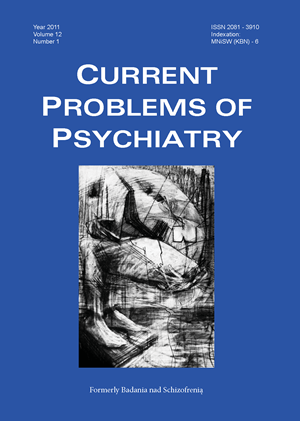Anxiety as a state and trait in women with normal and highly compromised pregnancy
Keywords:
anxiety, highly compromised pregnancy, normal pregnancyAbstract
Introduction: Anxiety accompanies a man even in his prenatal life. It has a particular form in the context of normal and compromised pregnancy, when a woman, apart from her own health, is also worried about the safety of her future baby. The aim of the study was to find out if there is a difference in the intensity of anxiety as a state (dependent on the situation) and as a trait (an acquired behavioral disposition) in the groups of women with normal pregnancy and with highly compromised pregnancy.
Material: The research comprised 111 women. The study criteria: 1) primipara, 2) the stage of pregnancy – up to the 32nd week. The study group: 61 women hospitalized at the Department of Obstetrics and Compromised Pregnancy Medical University of Lublin with an abnormal, pathological course of pregnancy. The control group: 50 women with a normal course of pregnancy. All the women were about 28 years old and came from Lublin or its vicinity; most of them were married and had higher or secondary education.
Methods: The State-Trait Anxiety Inventory (STAI) was used. It allows selecting the persons with a decidedly high or a decidedly low level of anxiety understood as a lasting inner disposition (that is a trait; it has the character of learned anxiety X2), and it makes it possible to record the intensity of anxiety occurring as result of certain defined external stimuli (as a state, X1).
Results: A higher, statistically significant (p=0.004) intensity of anxiety as a state (x-1) in the group of women with compromised pregnancy was demonstrated. This means that these women experience a higher level of situational anxiety as compared to women with normal pregnancy. No statistically significant difference was found in the value of anxiety (a lasting behavioral disposition).
Discussion of the results: A higher anxiety as a state (X1) in the group of women with compromised pregnancy, with a lack of increased anxiety as a trait (X2) concerns hospitalized women. They responded with anxiety to a threat to their pregnancy, which was strengthened by, among others, isolation from their loved ones.
Conclusions: 1. A compromised pregnancy significantly influences the level of anxiety as a state (dependent on external stimuli), but it does not influence the level of anxiety as a trait (a lasting behavioral disposition). 2. Hospitalization of women with highly compromised pregnancy may positively influence the intensity of the level of anxiety as a state, but it does not influence the intensity of anxiety as a trait.
References
1. Ciesielski M, Michałek M., Szlapo E., Ścisłowicz K. Typy osobowości a zaburzenia emocjonalne u kobiet z patologicznym przebiegiem ciąży. Wiad. Lek., 1994; 47(1-2): 25- 30.
2. Kwaśniewska A., Kraczkowski J., Wartacz E., Robak J., Semczuk M. Ocena lęku oraz analiza struktury osobowości kobiet zagrożonych porodem przedwczesnym i porodem po terminie. Post. Psychiatr Neurol.,1996; 5: 185-193.
3. Pawełczyk A., Cypryk K., Bielawska-Batorowicz E. Poziom lęku i wieź emocjonalna z dzieckiem w okresie ciąży u kobiet zdrowych i z cukrzycą ciążową. Diabetol. Pol. 1999; 6(3): 189-192.
4. Wrześniewski K., Sosnowski T., i wsp. Inwentarz Stanu i Cechy Lęku STAI, polska adaptacja. Warszawa; Pracownia Testów Psychologicznych: 2006.
5. Beisert M., Sęk H., Psychologiczne problemy kobiet w ciąży specjalnej troski. Gin. Pol., 1982; 53(11): 721-732.
6. Motyka M. Psychologiczne uwarunkowania powikłań położniczych. Gin. Pol., 1982; 53(5-6): 431-435.
7. Zdziennicki A. Lęk jako czynnik zagrożenia w perinatologii. Wiad. Lek., 1994; 47(17-18): 698-699.
8. Żrubek H., Czajka R. Czy istnieje zespół niepokoju związanego z ciążą i porodem?, Gin. Pol., 1988; (59) Supl.: 355-358.
9. Kraczkowski J., Szymona K., Smoleń A., Krzyżanowski A., Nasilenie i struktura niepokoju u kobiet z objawami poronienia zagrażającego a konsekwencje położnicze., Gin. Pol., 2003; 74(supl. 2): 108.
10. Rymaszewska J., Dolna M., Grzyboś M., Kiejna A. Zaburzenia psychiczne okołoporodowe – epidemiologia, etiologia, klasyfikacja, leczenie. Gin. Pol., 2005; 76(4): 323-328.
Downloads
Published
Issue
Section
License
Copyright (c) 2011 Authors

This work is licensed under a Creative Commons Attribution-NonCommercial-NoDerivatives 3.0 Unported License.


